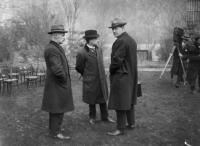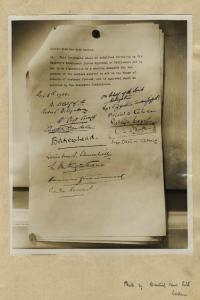TV eye : An Conradh/The Treaty, 1921
Published in 20th-century / Contemporary History, Issue 2(March/April 2012), Reviews, Revolutionary Period 1912-23, Volume 20
Eamon Duggan, Arthur Griffith and Michael Collins in London during a break in negotiations.
An Conradh/The Treaty was broadcast last December on the 90th anniversary of the signing of the Anglo-Irish Treaty on 6 December 2011. This prelude to a forthcoming decade of centenaries came just after news that the German Bundestag had received a sneak preview of the current Irish government’s forthcoming austerity budget. The irony of the apparent loss of Ireland’s fiscal sovereignty on the anniversary of the attainment of its sovereignty was not lost on some commentators. An Conradh/The Treaty, however, declined to go down such paths, and was all the better for not doing so.The ‘Articles of Agreement’ were signed by Michael Collins, Arthur Griffith and their colleagues in the early hours of 6 December 1921, following Prime Minister David Lloyd George’s dramatic ultimatum that the alternative would be ‘immediate and terrible war’—an inconvenient fact for those who would argue, along the lines lambasted by John Regan in the last issue of History Ireland, that the substance of the treaty could have been achieved through constitutional methods that were derailed by the actions of Republicans after 1916. The treaty of 1921 was undoubtedly far more substantial than the Home Rule on offer in 1912. But the reason for the shift in the British position is the stark fact that by 1921, thanks to Sinn Féin’s campaign of political resistance and the IRA’s guerilla war, the 26 counties that became the Irish Free State in December 1922 were rendered ungovernable in any practical sense from a British point of view. This is not to say, however, that the British had been comprehensively defeated; what Sinn Féin and the IRA had done was to bring them to terms. What the British had done was to ensure that they would be the final arbiter of those terms. This very impressive documentary focused tightly on the culmination of the negotiations, and the immediate breaking of the news that a treaty had finally been signed.

The signature page of the British original of the Anglo-Irish Treaty signed on 6 December 1921.
The treaty established the Irish Free State as a dominion within the British Empire, the constitutional status of which was to be based on that of Canada. Members of its parliament were to swear to be ‘faithful’ to the British monarch. This was the crucial issue of sovereignty that would precipitate civil war in June 1922—and not the issue of partition. One still comes across this notion that partition caused the civil war. But Ireland was partitioned in 1920, long before British and Irish delegations sat down across a table. The treaty gave Northern Ireland an opt-out clause, a fig-leaf to hide the stark fact that partition was a fait accompli. The principle of creating new borders was not unique to Ireland: after 1919 a defeated Germany lost a large proportion of its national territory. It is striking to bear in mind that so did a victorious United Kingdom. But nobody seriously expected Northern Ireland to add to that proportion by opting out of the UK. Instead, a council of Ireland would enable the governments in Belfast and Dublin to discuss matters of common interest—most strikingly, and ironically, ‘safeguards for minorities in Northern Ireland’. Likewise, neither government was to pass any legislation that would favour one religion over another. The record of the Stormont administration’s dealings with the Catholic minority under its control speaks for itself, and the Ryan report stands as a horrific testament to the abuse of Catholic power in the southern state founded in 1922. The council of Ireland never met, and these aspects of the treaty were to be honoured more in the breach than the observance.There were financial and military obligations to be imposed on the Free State too. The prospect of undermining the integrity of the Empire lay at the heart of British concerns; but while British interests were safeguarded, the clear expectation was that the new Irish Free State would be obliged to defend those interests by facing down those republicans who would inevitably find the treaty repugnant. For figures such as Collins, the balance of military forces left no choice in the matter: the treaty was the best that could be obtained in the circumstances. Thanks to Neil Jordan’s eponymous movie, an entire generation seems to have gotten distracted by the issue of whether or not Eamon de Valera ‘set up’ Michael Collins by not going to London himself; some time ago RTÉ even treated us to Alex Ferguson’s view on the matter. Yet one issue that comes through here is the extraordinary role played by Arthur Griffith in undermining his fellow delegates with a private assurance to Lloyd George to accept the stillborn Boundary Commission, assurance that gave him the basis for his ultimatum. Divided, and thereby ruled? Collins, on the other hand, openly admitted that he would have gladly defeated the British were it possible; he did not think that it was. This informed his decision to sign, and both he and Griffith brought immense pressure to bear on their fellow delegates to follow suit.
![Typescript note to the Department of Finance dated 8 October 1921 and initialled by ‘MOC’ [Michael Collins] in which he requests £50 (to enable him to join the other members of the Irish delegation in London). Collins concludes, ‘At the moment I have about £3 in my pocket. It would be serious if I could not give a porter a tip at Holyhead.’](/wp-content/uploads/2013/03/TV-eye-An-ConradhThe-Treaty-1921-3.jpg)
Typescript note to the Department of Finance dated 8 October 1921 and initialled by ‘MOC’ [Michael Collins] in which he requests £50 (to enable him to join the other members of the Irish delegation in London). Collins concludes, ‘At the moment I have about £3 in my pocket. It would be serious if I could not give a porter a tip at Holyhead.’
The National Archives of Ireland’s Treaty Exhibition is on-line at http://treaty.nationalarchives.ie/.
















